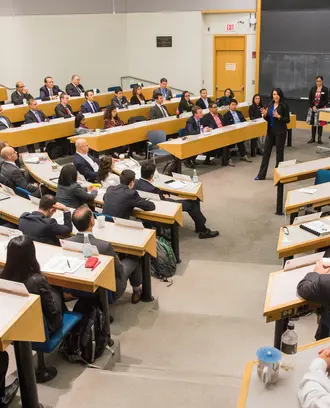Christine Hofbeck EMBA '16
Nine months after I completed the MIT EMBA program, I was fired. I walked into my manager’s office expecting a different sort of meeting. “We’re going to let you go,” he said. At that time, I was a vice president and actuary at a large global insurer. One might think this was a devastating blow (it wasn’t). But I’m getting ahead of myself, so let me back up a bit.
I’ve always been exceedingly practical, carefully orchestrating the details of my life. My undergraduate degree was prudently planned to ensure maximum career growth. I launched my career at one of the top benefits consulting firms in the country, plowed through my actuarial exams, and started a family. I spent almost two decades gloriously immersed in mathematics, data, and financial predictions, so when I decided it was time to earn an MBA, there really was no question which program I wanted to pursue–the top quant school with the extraordinary reputation. For me, it was MIT or nothing. I submitted only one B-school application.
Everything about the MIT EMBA program appealed to the practical me. I was enamored by the thinking, analyzing, and decision-making. I wanted to learn new methods of management, leadership, and innovation. I sought the knowledge and experience and arsenals of frameworks. The deliberate, logical, action-oriented learning appealed to my deliberate, logical, action-oriented brain.
For 20 months, I learned from our incredible professors. They brought me a world of unknown unknowns – sharing ideas that I hadn’t ever learned or even knew existed. Organizational Processes sent me down the magnificent rabbit hole of behavioral economics and the impacts of strategy, culture and power. Systems Dynamics left me drawing feedback loops in the margins of reports for dynamically evolving and complex organizations, in search of the downstream and potentially unseen consequences of decisions. Competitive Strategy opened my eyes to industry structure and the five forces framework. Every class and topic opened my eyes to something thought-provoking and remarkable. I used the frameworks immediately and directly in my everyday work, and the positive impact to my organization led to multiple promotions and the highest performance ratings.
During those 20 months, I also learned from my incredible classmates, who selflessly shared their own challenges, opportunities, successes, and failures. My classmates created a safe environment of positivity and support for each of us. They dared us to leap, cheering us on when we stuck a brilliant landing and picking us up again when we fell mightily. Years after graduation, that daring and cheering and picking up is still happening. Every. Single. Day.
In just 20 months, the MIT EMBA experience profoundly changed my life. But mostly, not in the way that I’d planned.
You see, while learning how to think, analyze, and make better decisions, I also learned that I am capable of far more than I ever thought possible. While exploring new methods of management, leadership, and innovation, I also explored the possibility that dreams which once seemed completely farfetched might actually be wholly achievable. While developing knowledge and experience and arsenals of frameworks, I also developed a deep sense of self and confidence and courage. They told us we’d drink from the firehose, and then unleashed an entire truck. I graduated from the program with not only a brain full of knowledge, but also a heart full of fire.
Nine months after graduation, I achieved one of those farfetched dreams that I never thought I’d actually realize (also, it has nothing to do with business). I was invited to compete on CBS’s hit reality television show Survivor. When I asked my manager for a couple months of unpaid leave to tape the show, I was let go. It wasn’t a devastating blow. Logically and practically, I understood the potential legal ramifications of an insurance executive appearing on a reality TV show…in underwear. But it was more than that. The truth was, my MIT EMBA experience gave me this insane depth of knowledge, the capability to be a visionary leader, and taught me to believe in myself. I knew that I’d be just fine.
I was, in fact, more than fine. My Survivor experience was a literal dream come true. When the game ended, I returned home to no job, so I simply dared to leap. I built a successful domestic and international speaking career. I was elected to the Board of Directors of the Society of Actuaries, and I began consulting in the InsurTech space. “You should write a book,” someone said to me in an airport overseas after a speaking gig. And then I did. My book, Winning Conditions, was picked up in a matter of weeks and will be published by Viva Editions/Simon & Schuster this fall. The flexibility and financial freedom of these varied roles allow me to completely enjoy my family and my kids’ myriad of sports and activities. While more traditional opportunities are available, non-traditional is a better fit right now.
This was the unexpected boon of the MIT EMBA program. I had carefully set out to pursue a program that would teach me a framework for exceptionally thinking and leading in the business world. And it did. But the MIT experience went far beyond those boundaries, also providing a beautiful, lifelong and unparalleled framework for living, and a network of extraordinary peers who continue to dare me to leap.
Christine Hofbeck, EMBA '16, is an actuary, keynote speaker, and author of Winning Conditions: How to Achieve the Professional Success You Deserve by Managing the Details That Matter.



